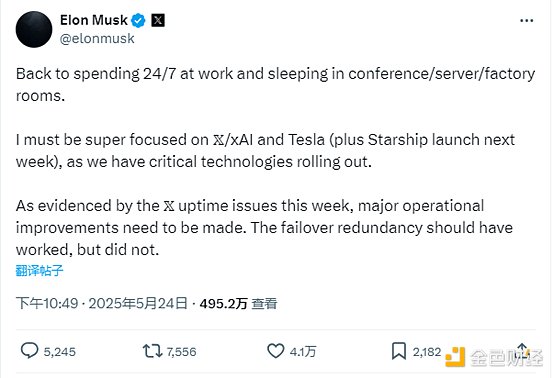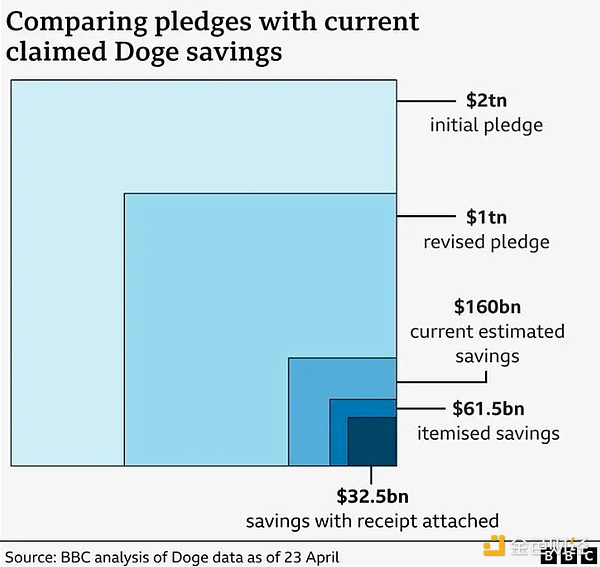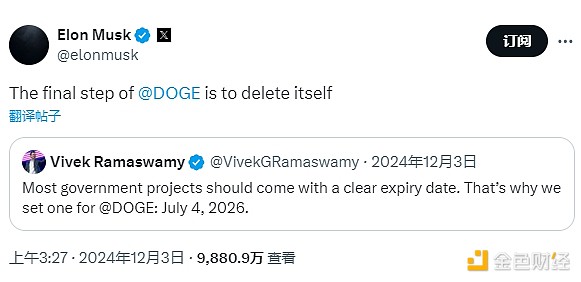Deng Tong, Jinse Finance
On May 29th, Musk confirmed his resignation in an X post and thanked President Trump for "providing an opportunity to reduce wasteful spending". The White House "removed" Musk from his position as a special government employee on Wednesday evening local time.
I. Why Did Musk Leave Doge?
The direct reason is Musk's status as a special government employee. Musk previously stated he would fulfill his duties as an external volunteer, and the White House later confirmed: he would work as an unpaid special government employee. This means he needs to participate in 130 days of federal work in a year.
Calculating from Trump's inauguration on January 20th, he would reach 130 working days by the end of May, so from a strict regulation perspective, Musk will leave the White House by the end of May.
But without this strict regulation, could Musk have continued working at the White House?
II. Was Musk Happy with His 130-Day White House Journey?
1. Disappointed with Trump's Bill
In interview segments shared by CBS on Tuesday, Musk pointed out that he was "disappointed" with Trump's budget bill, a Republican-supported bill that would increase federal debt by trillions of dollars (mainly by permanently extending massive tax cuts).
[Rest of the text continues in the same translation style]
Musk stated last week that he must be "highly focused" on his own companies and has "returned to a state of working 24 hours a day, sleeping in meeting rooms/server rooms/factory rooms".

III. Did Doge Really Save Money?
Doge claims to have saved over $10 billion per week on average since President Trump took office. But did it really save that much?
In October last year, Musk promised to cut the federal government budget by "at least $2 trillion". He then halved this target and stated on April 10 that he would save $150 billion by "reducing fraud and waste" by the end of fiscal year 2026. The federal budget for the previous fiscal year was $6.75 trillion.

US media also exposed some calculation errors, such as Doge incorrectly claiming savings of $8 billion by canceling an immigration contract worth $8 million.
Doge stated that they are working to upload all receipts in an "easily understandable and transparent manner", and as of April 20, the receipts published "account for about 30% of the total savings". Additionally, they listed some receipts that "cannot be obtained for legal reasons".
The largest individual savings amount listed by Doge was $2.9 billion.
This amount came from canceling a contract that was effective in 2023 during President Biden's term - a contract aimed at providing shelter services for up to 3,000 unaccompanied migrant children in a Texas facility. Doge seemingly subtracted the contract's total amount from expenses to date to arrive at the $2.9 billion figure. However, Doge's numbers are "based on speculative, never-used figures", and actual expenses depend on how many children would be placed in the facility and the services they would require. "In fact, the government never incurred these costs and could never reach this ceiling. It is estimated that the actual, recordable savings from early contract termination are around $153 million."
The second-largest savings expense listed by Doge came from canceling a contract between the IRS and an IT company called Centennial Technologies, valued at $1.9 billion. However, some government departments have poor record-keeping, meaning certain contract expenditures may not be updated in a timely manner. Moreover, Centennial Technologies' CEO has pointed out that the agreement was actually canceled during the Biden administration last fall.
Some analysts believe that the recently passed House budget only approved $9.3 billion in agency cuts, less than 5% of Musk's initial $2 trillion annual cost-cutting goal. Manhattan Institute budget analyst Jessica Riedl stated: "Doge is all bark and no bite, with actual cost savings likely far below $10 billion." Political realities expose Doge's nature, which may be nothing more than a superficial cost-cutting performance, with the federal budget's "chronic ailments" remaining untouched. Congressional members firmly control various agencies in the executive branch, and even Republicans are unwilling to let "vigilantes" like Musk interfere with their territory.
IV. Will Doge Continue to Operate After Musk Leaves?
On Thursday, The Wall Street Journal reported that approximately 100 Doge employees will remain in various government departments after Musk's departure. The White House has also stated that President Trump's cabinet members will work with government efficiency department staff in federal agencies to advance ongoing work. White House Press Secretary Caroline Levitt said that cabinet members "have been working closely with Musk and will continue to work with politically appointed government efficiency department employees in these agencies".
Musk and Trump had set a deadline for completing Doge's work, coinciding with the 250th anniversary of the US Declaration of Independence - Trump signed the executive order establishing the Doge project on his inauguration day in January, mentioning Doge's termination date as July 4, 2026.
As early as December, Musk responded to a tweet, "The last step of DOGE is self-destruction."

However, former Government Efficiency Department (Doge) employees, in their first interview after leaving, stated that with Musk's departure from the Trump administration, the government efficiency improvement project he led is likely to stall. Software engineer Sahil Lavi, who worked at Doge for nearly two months, predicted that the department would quickly "fold". "Like the dying whimper," Lavi, who was fired earlier this month, said, "The core charm of this project is Musk himself". He expects Doge employees to "gradually stop working, like children joining a startup that will collapse after four months".
Sources: Jinse Finance, BBC, Reuters, Bloomberg, Washington Post, NBC, NPR, etc.








